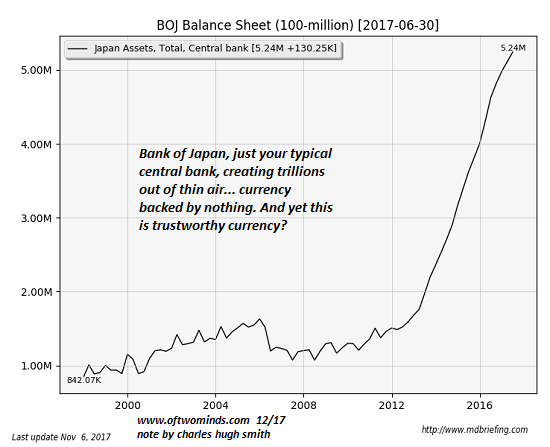
Authored by Charles Hugh Smith via OfTwoMinds blog,
All of which brings us to the "crazy" idea of backing fiat currencies with cryptocurrencies, an idea I first floated back in 2013, long before the current crypto-craze emerged.
Exhibit One: here's your typical central bank, creating trillions of units of currency every year, backed by nothing but trust in the authority of the government, created at the whim of a handful of people in a room and distributed to their cronies, or at the behest of their cronies.
And this is a "trustworthy" currency?
Exhibit Two: central banks can't become insolvent, we're told, because they can create as much currency as they want, whenever they want. And this is a "trustworthy" currency?
[image]https://www.oftwominds.com/photos2017/Fed-money-printing.jpg[/image]
Exhibit three: and here's what happens when trust in the currency is lost due to excessive currency issuance: the currency goes from 10 to the US dollar to 5,000 to $1 and then to 95,000 to $1, on its way to 2,000,000 to $1:
[image]https://www.oftwominds.com/photos2017/bolivar12-17.png[/image]
Yes, this was once a "trustworthy" currency.
While many people expect China to issue a gold-backed currency some day, they overlook the inconvenient reality that China is creating far more fiat currency than it is adding in gold reserves. They also overlook that gold-backed means nothing if the currency isn't convertible into gold.
If it isn't convertible, it isn't gold-backed. Claiming there's gold somewhere in a vault doesn't make a currency gold-backed, as the central bank can devalue the currency it issues at will. Gold-backed means the currency is pegged at X units of currency to 1 unit of gold, and X units of currency can be exchanged for 1 unit of gold.
All of which brings us to the "crazy" idea of backing fiat currencies with cryptocurrencies, an idea I first floated back in 2013, long before the current crypto-craze emerged: Could Bitcoin (or equivalent) Become a Global Reserve Currency? (November 7, 2013)
Since there is no real-world commodity backing the digital currency, its value must be based on scarcity and its ubiquity as money. The two ideas are self-reinforcing: there must be demand for the digital money to create scarcity, and the source of demand is the digital currency's acceptance as money that can be used to buy commodities, goods, services and (the ultimate test) gold.
Speaking of gold, correspondent Liberty Philosopher recently posed a scenario that was new to me: if gold continues losing value, could central banks dump their gold in favor of cryptocurrencies?
Yes, I realize this is anathema to those who anticipate a gold-backed currency becoming the dominant form of centrally issued currency, but the idea of governments that have debauched their currencies building reserves of decentralized and limited-in-issuance cryptocurrencies may not be as farfetched as you might imagine.
Here is Liberty Philosopher's commentary:
My understanding is that gold is kind of a reserve asset held by governments that provides the ultimate assurance that they are able to pay their debts. If the value of the assets they hold, which are a guarantee of their ability to pay, begins to erode, and the erosion in value is not a temporary or passing phenomenon, but a continuous and long-term trend, this would imply that the ability of governments to ultimately pay their debts would be eroding. If the value of gold begins to decline, governments who have gold reserves, but whose ability to pay their debts may be somewhat in question, would come under pressure to fortify their reserves as proof that they remained able to pay their debts.
If the price of gold were to continue to decline, my thought is that governments would be under pressure to sell the reserve asset that was declining in value, because the continuing decline in value would call into question their ability to repay their debts. They couldn’t just sit there and allow their reserves to decline in value year after year. They would have to act. If the need for having some kind of “hard” currency reserve remains (creditors may not want to accept newly printed bank notes in lieu of “hard” reserves), and they are forced to begin selling their gold reserves, what other hard reserve asset could they obtain or purchase? I think they could become purchasers of the most valuable cryptocurrencies as a replacement for their gold reserves.
The ideal reserve gains in purchasing power over time. If Venezuela had purchased bitcoin in size when it was $100, or even $1,000 in January 2017, its own currency wouldn't be heading to near-zero quite so quickly.
In my book A Radically Beneficial World, I proposed that nations which had debauched their centrally issued fiat currency could acquire the labor-backed currency I propose as reserves.
The acquisition of decentralized cryptocurrencies as reserves may sound crazy now, but as central banks destroy the purchasing power of their fiat currencies, all sorts of ideas that seem crazy now will start looking practical once the death spiral of the current unstable monetary regime begins.
* * *
I'm offering my new book Money and Work Unchained at a 10% discount ($8.95 for the Kindle ebook and $18 for the print edition) through December, after which the price goes up to retail ($9.95 and $20). Read the first section for free in PDF format. If you found value in this content, please join me in seeking solutions by becoming a $1/month patron of my work via patreon.com.